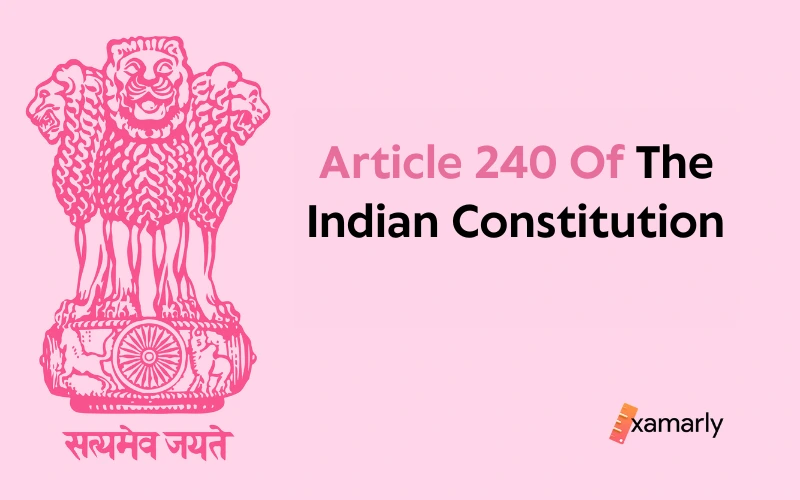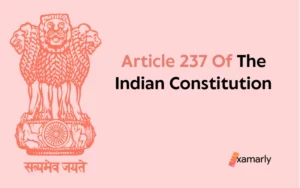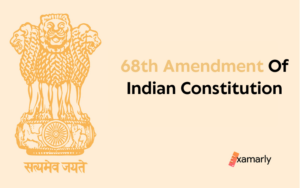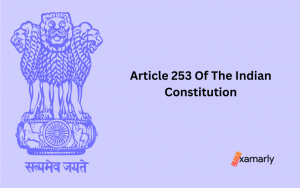The Union Territories (also known as UTs) are special administrative territories in India that are directly controlled and administered by the Central Government.
According to Article 240 of the Indian Constitution, the President has the authority to enact regulations for specific Union territories.
The said Article is outlined in Part VIII – ” The Union Territories” of the Constitution of India.
This page provides information regarding Article 240 and is worth reading for the preparation for the UPSC Exam as is a part of the Indian Polity of UPSC CSE Syllabus.
What Is Article 240 Of The Indian Constitution?
(1) The following Union territories may be subject to laws made by the President to promote peace, progress, and effective governance:
- (a) the Andaman and Nicobar Islands;
- (b) Lakshadweep;
- (c) Dadra and Nagar Haveli and Daman and Diu;
- (d)
- (e) Puducherry
- (f)
- (g)
In the event that any body is established in accordance with article 239A of the Constitution with the purpose of performing the duties of a Legislature for the Union territory of Puducherry, it is provided that the President shall not adopt any regulations for the peace, progress, or good governance of that Union territory with effect from the date set for the first meeting of the Legislature:
Additionally, the President may issue regulations for the peace, advancement, and effective governance of the Union territory of Puducherry during any timeframe in which the body acting as the Legislature for that Union territory is dissolved or its ability to serve as the Legislature is suspended due to any action taken in accordance with any of the laws mentioned in clause (1) of article 239A.
(2) Any regulation so made may repeal or alter any Act adopted by Parliament or any other law that is currently applicable to Union territory and, when issued by the President, has the same force and effect as an Act of Parliament that applies to that territory.
Facts For Article 240
- Article 240 of the Indian Constitution was substituted by the 7th Constitutional Amendment Act in the 7th year of the Republic of India.
- The said Article was amended by the 27th amendment of the Constitution of India.
- Sub-clause (c) was substituted by the Dadra and Nagar Haveli and Daman and Diu (Merger of Union territories) Act, 2019.
- Sub-clause (d) was deleted by the Dadra and Nagar Haveli and Daman and Diu (Merger of Union territories) Act, 2019.
- Sub-clause (e) was inserted by the 14th amendment of the Indian Constitution. And Puducherry was substituted by the Pondicherry (Alteration of Name) Act, 2006 for “Pondicherry.”
- Entry (f) relating to Mizoram omitted by the State of Mizoram Act, 1986.
- Entry (g) relating to Arunachal Pradesh omitted by the State of Arunachal Pradesh Act, 1986.
- The 1st proviso was added by the Constitution (Fourteenth Amendment) Act, 1962.
- The 2nd proviso was added by the Constitution (Twenty-Seventh Amendment) Act, 1971.
In A Nutshell
The President has the power to create legislation for certain Union territories, as stipulated in Article 240 of the Indian Constitution. These UTs are:
- The Andaman and Nicobar Islands;
- Dadra and Nagar Haveli and Daman and Diu;
- Lakshadweep;
- Puducherry
FAQs
What are Union Territories?
Federal territories known as Union Territories (UTs) are governed by India’s Union Government. They are also referred to as areas with central administration. The President of India is responsible for the appointment of Lieutenant Governors (LGs) in the Union Territories. The LGs operate in an administrative capacity for the UT. In 1956, the States Reorganization Act paved the way for the creation of the UTs. The seventh constitutional amendment Act introduced the concept of the UT.
What Power Did The President Of India Have As Per Article 240?
The President has the power to create legislation for specific Union territories, as stipulated in Article 240 of the Indian Constitution. Puducherry, Andaman and Nicobar Islands, Dadra and Nagar Haveli and Daman and Diu, and Lakshadweep are these specific Union Territories.
Which Amendment Amended Article 240?
The 7th amendment, 14th amendment, and 27th amendment are the amendments of the Indian Constitution that have revised Article 240.
What Does Article 239A Deas With?
The establishment of local legislatures, Councils of Ministers, or both in some Union Territories is covered by Article 239A of the Indian Constitution.






